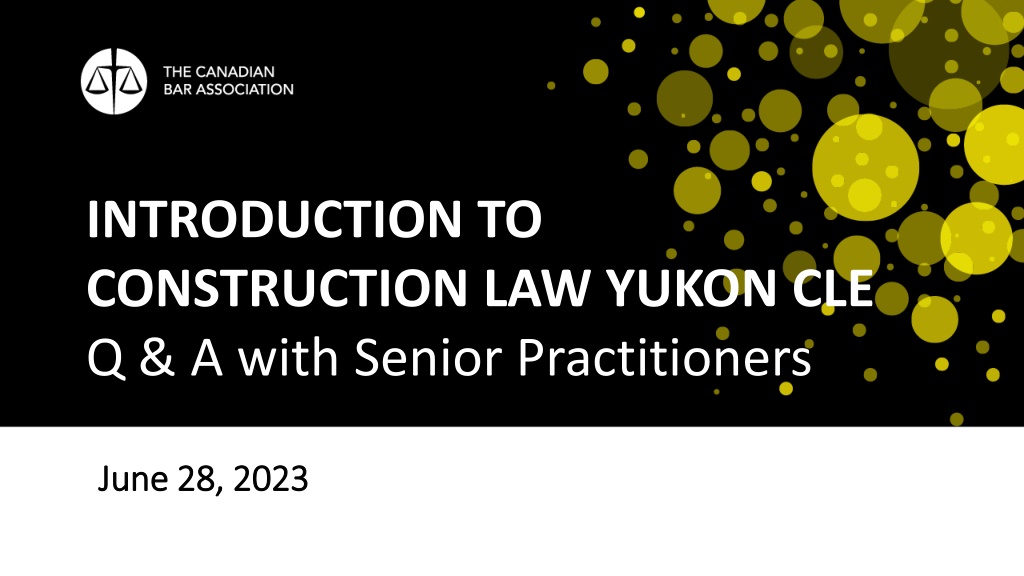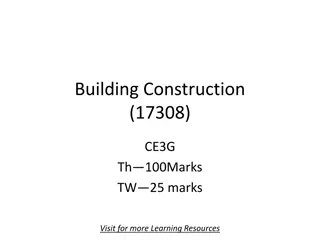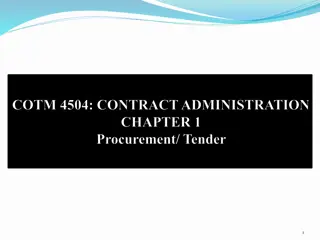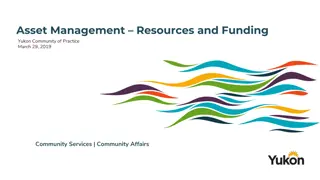Construction Law Yukon CLE Q&A Overview
Gain insights into construction law practices in Yukon through this comprehensive Q&A session with senior practitioners. Topics covered include standard form agreements, drafting essential terms, risk allocation clauses, construction insurance, and bonding products. Learn about different types of contracts, general contract structures, construction management, design-build processes, common drafting pitfalls, and essential components of construction contracts.
Download Presentation

Please find below an Image/Link to download the presentation.
The content on the website is provided AS IS for your information and personal use only. It may not be sold, licensed, or shared on other websites without obtaining consent from the author.If you encounter any issues during the download, it is possible that the publisher has removed the file from their server.
You are allowed to download the files provided on this website for personal or commercial use, subject to the condition that they are used lawfully. All files are the property of their respective owners.
The content on the website is provided AS IS for your information and personal use only. It may not be sold, licensed, or shared on other websites without obtaining consent from the author.
E N D
Presentation Transcript
INTRODUCTION TO CONSTRUCTION LAW YUKON CLE Q & A with Senior Practitioners June 28, 2023 June 28, 2023
Topics covered: Standard form agreements Drafting construction contracts: essential terms and common pitfalls Risk allocation clauses Overview of Construction Insurance and Bonding products
Standard Form Agreements 1. CCDC 2. MMCD 3. Ministry of Transportation and Infrastructure 4. Yukon Territorial Government Source: Fabian Gieske on Unsplash
Types of Contracts Types of Contracts CCDC Type Fixed price CCDC 2 Cost-plus CCDC 3 Construction Management CCDC 5A / CCDC 5B Design Build CCDC 14
General Contract CCA 1 Material Subcontractor 1 Owner Supplier CCDC 2 (fixed price CCDC 3 (cost-plus) Sub- General Contractor subcontractor Subcontractor 2 CCA 1 P.O (Purchase Order) Architect CCA 1 Subcontractor 3
Construction Management Construction CCDC 5A/5B Manager Owner CCDC 17 Trade 1 CCDC 17 Trade 2 CCDC 17 Architect Trade 3
Design Build CCDC 14 Owner Design Builder Architects/ Trades Engineers
Construction Contracts: Overview Parts of a construction contract: Articles, identification of parties, project and price General conditions Supplemental conditions Other contract documents Specifications Drawings Schedule rates Incorporation by reference
Construction Contracts: Common Drafting Pitfalls Lack of a (written) contract Ambiguity in key commercial terms Conflicts in contractual provisions Incomplete or unidentifiable specifications / reference documents Incorporation by reference provisions Compliance with builders lien legislation
Construction Contact: Key Provisions Key terms and conditions of the construction contract include inter alia: Pricing method / payment Scope of work / services Schedule for delivery; consequences of delay in delivery Changes in the work / services Dispute resolution Default and termination Indemnities Limitation of liability Insurance requirements Warranties Entire Agreement Clauses
Allocation of Risk Clauses 1. Guarantees 2.Warranties 3. Indemnities Image Source: Cytonn Photography on Unsplash
Guarantees and Warranties Warranty: a promise to bear the risk of loss that will flow from a failure of a fact to occur in the future. Guarantee: an accessory contract by which the promisor undertakes to be answerable to the promisee for the debt, default or miscarriage of another person.
Warranties Express Warranties: Explicit wording in contract Implied Warranties: Statutes Common industry practices Conduct of the parties Reliance on a contractor s specialized skills
Greater Vancouver Water District v. North American Pipe & Steel Ltd.,2012 BCCA 337 The Supply Contractor warrants that the Goods will conform to all applicable Specifications and, unless otherwise specified, will be fit for the purpose for which they are to be used. The Supply Contract warrants and guarantees that the Goods are free from all defects arising at any Time from fault design in any part of the Goods. Steel Co. of Canada v. Willard Management Ltd., [1996] 1 S.C.R. 746
Indemnity Clause A promise to compensate for a loss which may occur to another party on account of a future event Typically in construction contracts, indemnity clauses deal with liability for third party claims
Construction Insurance 1. Builders Risk (Course of Construction) Insurance 2. Commercial & Contractual General Liability Insurance (CGL) 3. Errors & Omissions 4. Wrap-Up Insurance 5. Commercial Vehicle Insurance
Builders Risk (Course of Construction) Insurance Property based policy 1st party policy claims Can include unnamed insure Can involve a bar to subrogation (no fault) Commonwealth Construction Company vs. Imperil Oil Ltd., (1976) G9 D.C.R. (3a) 558 (S.C.C.)
Commercial & Contractual General Liability Insurance (CGL) Each party has their own CGL Third party insurance triggered when sued and there is resultant damage Does not cover prior workmanship warranty
Errors & Omissions For architects and engineers (and other consultants or professionals)
Wrap-Up Insurance Intended to cover all contractors, professionals and trades One claim on policy for one event Typically begins on substantial performance Time on risk
Commercial Vehicle Insurance Automotive Aircraft Equipment
Construction Bonding 1. Bid Bond 2. Performance Bond 3. Labour and Material Bond 4. Lien Bond
Bid Bond Used during tendering A contractor is awarded a contract through a tender process If the contractor cannot or refuses to accept the contract, owner can call on the bid bond Intended to ensure the integrity of the bidding process
Performance Bond Bonding Component Guarantees the performance of a contractor or trade If contractor is in default, the surety/bonding company will pay for the completion of the principal s contract, up to the value of the bond Protects against bankruptcy
Labour and Material Bond Key collection strategy, often overlooked by non-construction lawyers General contractor or subcontractor may have (L&M Bond) Will guarantee payment if principal fails to pay Owner or general contractor must disclose the existence and provide a copy if asked Valara Construction v. Bird Construction, [2018] 1 SCR 224
Lien Bond Replaces the security of a lien with a lien bond A promise to pay if the lien claimant is successful at court

























